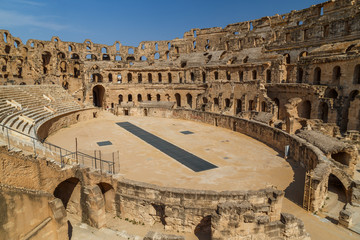#56DaysofAfrica - Tunisia
- Africa Matters

- Jun 1, 2020
- 3 min read
The small but mighty nation of North Africa
Pour lire la version français de cet article cliquez ici.

Today we will be highlighting Tunisia as the second country in our #56DaysofAfrica Series.
Tunisia who had been under French protectorate for almost a century gained their independence on March 20, 1956. This occurred after long negotiations and resistance from France. The state was headed by Habib Bourguiba, the major figure in the fight for independence. His presidency lasted from 1957 to 1987.
The official languages of Tunisia are Arabic and French. The majority of their population is around 98% Islamic while about 2% follow Christianity and Judaism or other religions.
Tunis, the capital of Tunisia is the largest city in the country. It maintains an Old World charm, split between the sinuous market quarter that is the medina and a grid of avenues originally planned by the French in the late 1800s.

Youth Empowerment
Tunisian youth are no strangers to raising their voices against political injustices and fighting for equality for all. Every 14th of January, Tunisia celebrates Revolution and Youth Day to commemorate the Jasmine Revolution uprisings in January 2011. The revolution was sparked by protests against corruption, poverty, and political repression and forced President Zine el-Abidine Ben Ali to step down. The success of the Tunisian uprisings shook the world as it inspired a wave of similar protests throughout the Middle East and North Africa called the Arab Springs.

Our Tunisian Africa Matters Ambassadors Program (AMAP) Ambassadors are continuing to create change in their respective communities. As part of their involvement in the program, Ambassadors are to identify issues that affect their communities and establish tangible and sustainable solutions to rectify them. They are to collaborate and train youth in their communities who do not form part of the Africa Matters community to achieve tangible youth empowerment cross communities.
The leader in me is working to make change and impact humanity based on my vision and values. - Amira Abdelli
Since commencing the program, our Ambassadors have been able to reflect on how they envision leadership in Africa and finding ways to unpack the negative notions of African leaders and identifying effective African leaders whose African youth can look up to. Have a look at our Ambassadors journey with Amira Abdello's take on African Leadership, Tofa Franck's Youth Leadership Development Program Session and Malek Abidi's webinar on How to prevent violent extremism through heritage and culture?
For the culture
The culture of Tunisia is mixed due to its long-established history of outside influence from people who all have left their mark on the country. Tunisia’s national dish is couscous, which is often served with vegetables and meat or fish and a delicious sauce. Authentic Tunisian cuisine can be found in traditional restaurants.
With dishes such as brik (a delicious pastry dough stuffed with egg, parsley, and tuna) orfricassé (a savory donut stuffed with tuna, boiled egg, olives, and harissa). Tunisians add harissa, which is a fiery pepper sauce, to almost everything. You’ll also find delicious sweet treats in cafes and restaurants when it’s time for dessert. Find out more about Tunisian dishes here.
Notable Landmarks
Tunisia's long and rich history has left behind some monumental gems and important ancient landmarks. It boasts a total of 8 UNESCO World Heritage Sites second to Ethiopia including the 6,000 year old Amphitheatre of El Djem. The Amphitheatre of El Djem is considered to be home to the most impressive Roman remains in the whole of Africa.
If you are looking for a great place to shop for spices and fashion, the souq in the ancient Medina of Tunis is where you should go. It is one of the most relaxed in North Africa but is still an authentic, working market. Another intriguing location in Tunisia is a small town in the South called Matmata. Matmata is best known for its underground cave or troglodyte structures, which house some of the local Berber population.
The mighty but small country of North Africa is full of ancient culture and revolutionary leaders. We cannot wait to continue to work alongside our Ambassadors to ensure the youth of Tunisia are empowered and uplifted as Africans.

Be sure to follow us on Instagram and Facebook to find out more information about Tunisia in the next few days. Feel free to share your personal experiences in Tunisia with us!
Stay tuned for the next #56DaysofAfrica country highlight on Thursday.
"We Are The Ones We've Been Waiting For"






























Comments